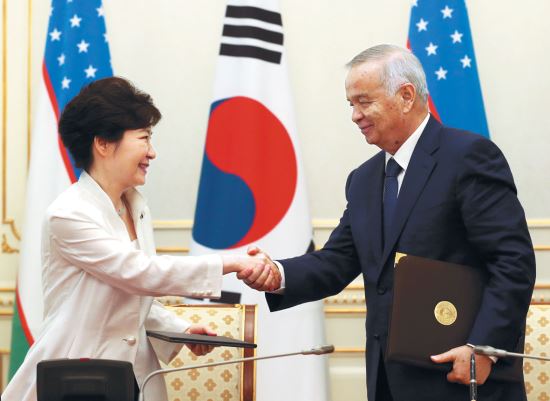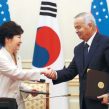
Seoul Seeks Central Asian Partners
Publication: Eurasia Daily Monitor Volume: 11 Issue: 127
By:

During her week-long visit last month (June 2014) to Central Asia, South Korean President Park Geun-hye made further progress in advancing her “Eurasia Initiative,” which she announced in October 2013. The Initiative aims to deepen South Korean ties with Europe through Russia, China and Central Asia (Korea Herald, June 9). The focus of the Initiative is to reduce physical and other barriers to greater economic exchanges among Eurasian countries as well as between their region and other Asian partners, such as South Korea. Projects include building new roads and railways, increasing regional foreign investment, and enhancing regional security (Yonhap, June 17).
The Eurasia Initiative builds on Seoul’s longstanding interest in the region. South Korea established a Central Asia Cooperation Forum in 2007 as a dialogue mechanism for discussing collaborative projects. The annual meetings aim to expand cooperation in the information, communications, construction, transportation, science, culture, education and tourism sectors. At its last meeting in April 2014, the participants adopted projects in the spheres of health care, environmental protection, agriculture and forestry, and discussed creating a secretariat for the Forum (Trend, April 24).
On June 16–18, Park visited Uzbekistan, where she met with President Islam Karimov and other Uzbekistani officials. In a move underscoring the Eurasia Initiative, on June 18, Park took a tour of key historical sites in Samarkand, the city known for its central position on the former Silk Road trade route between Asia and Europe.
Uzbekistan is South Korea’s leading trade partner in Central Asia. Their bilateral commerce has been rising steadily in recent years and South Korea is now Uzbekistan’s fourth-largest trading partner after Russia, Kazakhstan and China. Last year, their bilateral trade exceeded $2 billion. With an estimated $8 billion worth of joint projects, South Korea is also one of Uzbekistan’s largest sources of foreign investment, along with Russia, China and Kazakhstan (Yonhap, June 17). Although their economies are complementary, the bilateral trade is balanced heavily in South Korea’s favor due to Uzbekistan purchasing costly technological products and other high-value goods while selling mostly natural resources such as uranium and cotton to Korea.
In Tashkent, Park and Karimov reviewed existing South Korean business activities in this Central Asian republic, such as the gas and pipeline project at the Surgil gas field near the Aral Sea and the construction of a thermal plant expansion project in Talimarjan, 440 kilometers southwest of Tashkent (BusinessKorea, June 19). During Park’s visit, LS Group signed a strategic alliance agreement, worth some $500 million, to sell Uzbekistani companies tractors, electricity, telecommunications infrastructure, auto parts and industrial materials (BusinessKorea, June 26). Korea Hydro & Nuclear Power confirmed plans to buy more uranium from Navoi Mining and Metallurgical Combine (CA-News, June 24). South Korea recently also signed a $300 million contract to build a 100-megawatt solar power plant in Samarkand. The Korea International Cooperation Agency will provide $250 million for investment in projects related to the plant. Koreans hope that the success of this project will make it easier for South Korea to play a major role in constructing a 4-gigawatt solar power plant in Uzbekistan by 2030 (Yonhap, June 20).
A focus of Park’s visit was to secure South Korean participation in constructing a natural gas processing plant and a $4 billion natural gas development project in Uzbekistan’s Bukhara region, where a consortium of Uzbekistani and Russian firms are developing the Kandym gas field. The field is estimated to hold 150–180 billion cubic meters of gas, of which 8 billion cubic meters is expected to be processed annually through this project (Yonhap, June 20).
Furthermore, the two governments signed framework agreements for South Korea to provide grant-type aid to Uzbekistan as well as establish an Economic Development Cooperation Fund for the 2014–2017 period. In turn, Uzbekistan’s government pledged to create a benign environment for foreign investment. Uzbekistan also expressed its support for South Korea’s foreign policy agenda, such as the “Korean Peninsula trust process” and the “Northeast Asia peace and cooperation vision.” In a joint media appearance with Karimov, Park expressed “hope that our two countries will go hand in hand and jointly implement the Eurasia Initiative in detail” (Yonhap, June 17)
At their summit, Park and Karimov signed a joint statement backing greater collaboration in economic, scientific, educational and cultural domains. In coming years, both countries would like to broaden economic cooperation beyond energy to include communications, transportation, information technology, and environmentally friendly, green-growth initiatives.
Park ended her trip by becoming the first South Korean president to visit Turkmenistan since the two countries established diplomatic relations in 1992. She met with President Gurbanguly Berdimuhamedov and oversaw the signing of new economic agreements. South Korean businesses already have more than $5 billion worth of projects in Turkmenistan (CA-News, June 2). These contracts include a $2.5 billion gas-to-liquids plant with an annual capacity of 600,000 tons and a $1.5 billion plant that makes polyvinyl chloride and sodium hydrate (Reuters, June 20).
During Park’s visit, preliminary agreements were signed on building a $2 billion gas-chemical plant in the Seydi District of Lebap Province, a $3 billion refinery that would convert natural gas to liquid fuels such as kerosene and diesel, as well as a deal allowing South Koreans to sell $7.75 billion worth of products manufactured by jointly owned chemical processing and desulfurization plants (Yonhap, June 20).
Park’s Eurasia Initiative is one of many international efforts to revive the ancient Silk Road that once linked Europe and Asia. But it faces the same barriers as those projects promoted by the United States, China and other countries: the war in Afghanistan, an undeveloped physical transportation infrastructure, regional rivalries, and a reluctance to relax border controls that help limit the spread of transnational threats such a terrorism and narcotics trafficking.
South Korea has certain advantages in terms of skillful diplomacy and innovative industries, but Russia and China are closer. Indeed, Moscow has shown a willingness to use coercion to enforce its integration preferences, while Beijing is willing to apply enormous funds to secure local buy-in for its projects. So Seoul will not have an easy time bringing its Eurasia Initiative to fruition.
Hudson Institute intern Dahyun Choi contributed to this article.




